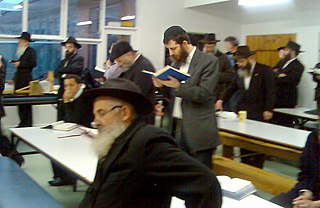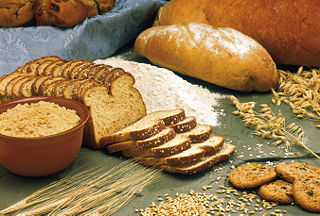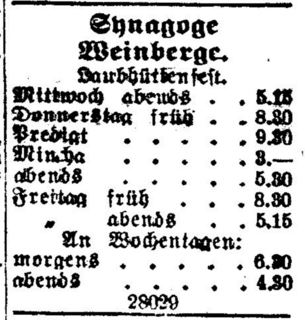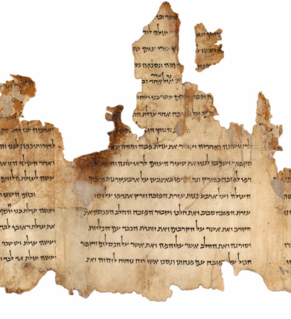
Jewish prayer are the prayer recitations and Jewish meditation traditions that form part of the observance of Rabbinic Judaism. These prayers, often with instructions and commentary, are found in the siddur, the traditional Jewish prayer book. However, the term tefillah as referenced in the Talmud refers specifically to the Shemoneh Esreh.

The Mishnah or Mishna is the first major written collection of the Jewish oral traditions known as the "Oral Torah". It is also the first major work of Rabbinic literature. The Mishnah was redacted by Judah the Prince at the beginning of the third century CE in a time when, according to the Talmud, the persecution of the Jews and the passage of time raised the possibility that the details of the oral traditions of the Pharisees from the Second Temple period would be forgotten. Most of the Mishnah is written in Mishnaic Hebrew, while some parts are Aramaic.

The Amidah, also called the Shemoneh Esreh, is the central prayer of the Jewish liturgy. This prayer, among others, is found in the siddur, the traditional Jewish prayer book. Due to its importance, it is simply called hatefila in rabbinic literature.

Birkat Hachama refers to a rare Jewish blessing that is recited to the Creator, thanking Him for creating the sun. The blessing is recited when the sun completes its cycle every 28 years on a Tuesday at sundown. Jewish tradition says that when the Sun completes this cycle, it has returned to its position when the world was created. Because the blessing needs to be said when the sun is visible, the blessing is postponed to the following day, on Wednesday morning.
Ahava rabbah is a prayer and blessing that is recited by followers of Ashkenazi Judaism during Shacharit immediately prior to the Shema, the "Hear O Israel..." prayer. Sephardi Jews, as well as those whose custom is Nusach Sepharad, begin this blessing with the words "Ahavat Olam" instead of Ahava rabbah; which is not to be confused with the shorter blessing of Ahavat Olam recited by both Sefardim and Ashkenazim during Maariv.

Shacharit[ʃaχaˈʁit], or Shacharis in Ashkenazi Hebrew, is the morning Tefillah (prayer) of the Jewish people, one of the three daily prayers.

Mincha is the afternoon prayer service in Judaism.
Shimon Bar Kappara was a Jewish rabbi of the late 2nd and early 3rd century CE, during the period between the tannaim and amoraim. He was active in Caesarea in the Land of Israel, from around 180 to 220 CE. His name, meaning “Son of Kapparah”, was taken from his father, Eleazar ha-Kappar. He was one of the students of Rebbi, and an Amora of the first generation.

Birkat Hamazon, known in English as the Grace After Meals, is a set of Hebrew blessings that Jewish Halakha prescribes following a meal that includes at least a kezayit piece of bread or matzoh made from one or all of wheat, barley, rye, oats, and/or spelt. It is a mitzvah de'oraita, that is written in the Torah.
Mussaf is an additional service that is recited on Shabbat, Yom Tov, Chol Hamoed, and Rosh Chodesh. The service, which is traditionally combined with the Shacharit in synagogues, is considered to be additional to the regular services of Shacharit, Mincha, and Maariv. In contemporary Hebrew, the word may also signify a newspaper supplement.
In Judaism, a berakhah, bracha, brokho, brokhe is a formula of blessing or thanksgiving, recited in public or private, usually before the performance of a commandment, or the enjoyment of food or fragrance, and in praise on various occasions.
Tachanun or Taḥanun, also called nefilat apayim, is part of Judaism's morning (Shacharit) and afternoon (Mincha) services, after the recitation of the Amidah, the central part of the daily Jewish prayer services. Traditionally, only the first four words of the prayer are said aloud so that others take notice. It is omitted on Shabbat, Jewish holidays and several other occasions. Most traditions recite a longer prayer on Mondays and Thursdays.

Zmanim are specific times of the day in Jewish law.

Maariv or Ma'ariv, also known as Arvit, is a Jewish prayer service held in the evening or night. It consists primarily of the evening Shema and Amidah.
Yotzer ohr, also known as Birkat yotzer or Birkat Yotzer Or, is the first of the two blessings recited before the Shema during Shacharit, the morning religious services of Judaism.
Emet Veyatziv is a blessing recited by Jews during Shacharit, the daily morning prayer. It immediately follows the Shema and precedes the Amidah.

The Birkat haMinim is a Jewish curse on heretics (minim). Modern scholarship has generally evaluated that the Birkat haMinim probably did originally include Jewish Christians before Christianity became markedly a gentile religion. It is the 12th of the Eighteen Benedictions or Amidah.















